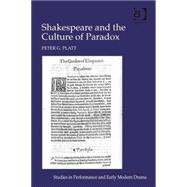
Note: Supplemental materials are not guaranteed with Rental or Used book purchases.
Purchase Benefits
What is included with this book?
| Introduction: `And that's true too': Shakespeare's culture of paradox | |
| 'New, straunge, incredible, and repugnant to the opinion of the hearer': the power of the paradox in early modern culture | |
| 'The meruailouse site': Shakespeare, Venice, and the paradox of place | |
| 'To do a great right, do a little wrong', or gaining by relaxing: equity and paradox in The Merchant of Venice and Measure for Measure | |
| 'Double dealing ambodexters': the paradoxes of playing | |
| Works cited | |
| Table of Contents provided by Publisher. All Rights Reserved. |
The New copy of this book will include any supplemental materials advertised. Please check the title of the book to determine if it should include any access cards, study guides, lab manuals, CDs, etc.
The Used, Rental and eBook copies of this book are not guaranteed to include any supplemental materials. Typically, only the book itself is included. This is true even if the title states it includes any access cards, study guides, lab manuals, CDs, etc.